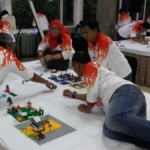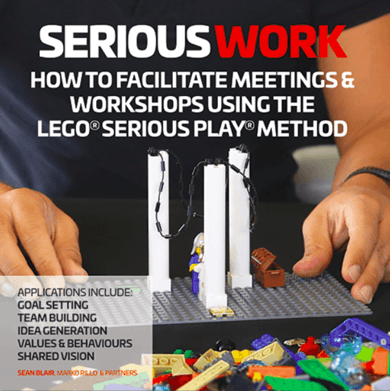Popularising LSP?
Tagged: indonesia sebastian strategic workshops deliverables value detailed reports consulting experience
- This topic has 4 replies, 4 voices, and was last updated 8 years, 4 months ago by
 Sebastian.
Sebastian.
-
AuthorPosts
-
July 21, 2015 at 12:14 pm #5604
 Marko RilloKeymaster
Marko RilloKeymaster500 firms in Fortune 500 – and only a fraction of them use LEGO® SERIOUS PLAY®. There are millions who might benefit from LEGO® SERIOUS PLAY®. Coaches and consultants, teachers and trainers, professors and policy makers, HR and quality managers, therapists and thinkers, innovators and engineers, project managers… and so on. All of them potentially benefiting from various applications of LEGO® SERIOUS PLAY®. What a wealth of opportunities!
Given the upcoming global LSP meetings in Europe and America I would like to encourage exchange of ideas on popularizing the LEGO® SERIOUS PLAY®. Lets help to try to find new and innovative ways: “How to share or expand the LEGO SERIOUS PLAY method to everyday toolkit of various professions around the world?”
What do you think? How would you build your idea with LSP?
March 2, 2016 at 12:40 pm #6686 Manuel GrasslerParticipant
Manuel GrasslerParticipantWell I believe if we can come up with an instant LSP format this would help to popularize the methodology.
On the other hand I introduced LSP as the To-Go Format for all Project Scoping workshops we conduct with our clients.
We use it as an initial kickoff to melt together the team as well as getting deep insights into the project landscape upfront to better plan the project route/roadmap/approach.It really helps to improve the project delivery afterwards.
I am currently working in the HR area and we implement HR software as well as Transformational Change and we are adressing Fortune 500 as well.March 2, 2016 at 3:21 pm #6690 Marko RilloKeymaster
Marko RilloKeymasterManuel! Sounds interesting – thanks for sharing! Would you mind writing a (set of) longer case study(studies) about your experience for the readers?
March 3, 2016 at 9:42 am #6707 Massimo MercuriParticipant
Massimo MercuriParticipantVery sensitive subject … I have conflicting feelings about this.
On one hand, after more than 100 workshops (we are 3 facilitators in DSM and we co-facilitate often to learn from each other and improve) we have become convinced that the “plain vainilla” script is the best you can do to achieve meaningful impact. The power of the method is the connection and harmonization of the minds that play together, that goes beyond collective intelligence and include the emotional intelligence of the participants.On the other hand, we have to recognize that the weakness of the method -and the reason why the executive layer prefers to use it when there is no other way available- is that the extraction of tangible deliverables on the spot, is poor. Management acknowledges the “soft” result of teaming and alignment immediately, but in business the actual value generation comes later and only very intelligent people are capable to make the connection to the LSP experience they had maybe six months or even years before. We have a project that started in 2013 and just finished last week, the project manager invited me to the final drinks because he recognized the collaboration would not have been possible without the initial LSP workshop. But that is just one case and the higher you go in the C-scale is usually representative of a shorter attention span: executive will not remember or simple cannot connect the business success to the LSP workshop you did a long time ago. That is why many will consider LSP a simple “ice-breaker”.
How did we solve it? by specializing it, adding tools from other methods around the workshop to capture the outcome in real time. We added one, sometimes two people, to fill up mindmaps, quadrants, charts and even write down in some project brief document sections while the workshop is happening. That way the participants have a tangible confirmation that there is a documented knowledge that can be cascaded or transferred to others in the organization. In that way becomes easy to communicate strategy, project planning, risk assessments, stakeholder analysis and so on.
In short my point is, the actual capital of the method is the method itself and that should not be undervalued just to have everybody using it. We have to be careful that popularization does not become “making it cheap” in value generation. There are too many facilitators doing ice-breakers for free and that is only damaging the image of the methodology.
I also believe that many facilitators certified just because they like playing with LEGO and they think that the method will give them the purpose … that is very naïve, because any method is empty if it does not relate to the situation or circumstance (and language) of the group or organization that is applyin it … maybe we should be more careful and certify people who have already good experience in some fields beside facilitation and plan to improve their impact by aquiring a powerful method like LSP. Otherwise all the mass-training generate facilitators who do not understand the intrinsic effects of the method in regards to individual and organizational learning. I would not have been capable to achieve the results I did in the last 3 years if I did not have previous knowledge to fit the method to the circumstance, I think the worst enemy of the popularization of the method is the mass-training of facilitiators.
LSP is about System Thinking, and that is a scarse knowledge in the general population. Probably we should make it more exclusive and that will automatically make it more valuable for the customers who are spending a lot of money in “team building” or “strategy” activities that are much more expensive than a two-day LSP workshop … and maybe that is precisely why they do not ask for it, it’s seen as “cheap” due to the way it is marketed.having said so (and sorry for writing a lot) we all have the right to disagree, but I am sure this will trigger some thoughts.
Keep the discussion going!
March 6, 2016 at 4:13 pm #6804 SebastianParticipant
SebastianParticipantDear Massimo,
You have brought up a very good and much needed topic to discuss.
I have also done nearly 75 workshops here in Indonesia with several thousand participants overall (just counted) with both locals and multinationals, Government entities, staff level all the way up to Board of Directors and even Government Ministers.
At the intro stage the perception is always that LSP is for ice breaking or a fun experiential activity. You then have to use a lot of fotos, testimonies, Post Workshop Action Plan Reports, Workshop analysis statistics and matrices to convince them that we are in fact doing serious applicable work.
If I stuck to just the SGPs as a workshop deliverable, I don’t think the client would be that happy and the HR L&D department would have a hard time justifying the expense. Of course when the workshop is done at the Highest levels of the organisation then this does not become an issue as CEOs tend to be happy with the process and results and actually recommend it to cascade to their staff (this often happens).
My background is > 20 years in consulting and training in Austrade, Coopers & Lybrand then PricewaterhouseCoopers and MDI so you tend to get an idea on what the client expects from a consultant for the dollar spent, and details and follow ups is high on their wish list.
I agree that we are not selling LSP really, we are selling facilitation on strategy, team alignment, service level improvement, corporate culture shaping, supply chain improvement, Kaizen, etc.
The pre workshops I do can be quite extensive with pre interviews with participants and management, pre and post surveys, follow up post workshops etc.
The reports themselves can cover:
– Identification of ideal state
– ideal states vs current state and the current gap (in %)
– influencing factors (Hi – Medium – Low)
– Solution Initiatives: (Hi – Medium – Low Impact Solutions)
(Short – Medium – Long Term Time Solution Time Frame)
(Resource availability – PICs, Tools, etc)
– Action Plan : PIC, KPI, Schedule, Supervisor, Monitoring, Lag & Lead Measures)It can be quite extensive and detailed, but the point is that you have doable, measurable actions that can be monitored and followed up on with the client and modified over a series of workshops and results. Its really satisfying to check in with the client later on and see that they have implemented the action plans from the LSP workshop or if behavior has changed based on a follow up survey.
What I actually do is use something like the 4 Disciplines of Execution by Covey, Leoncini’s 5 dysfunctions of a team, Porters 5 forces, LEAN (TIMWOOD), KAizen etc and then format it to be explored with LSP.
As you say Massimo, you need a sound foundation in tools and methods to give meaningful deliverables to clients, or you just become a One Fun Workshop Wonder.
Having said that, Ihave ru a few workshops where all they wanted was a fun bonding experience and hey, it pays the bills!
-
AuthorPosts
- You must be logged in to reply to this topic.

 Become a LEGO Serious Play facilitator - check one of the upcoming training events!
Become a LEGO Serious Play facilitator - check one of the upcoming training events!